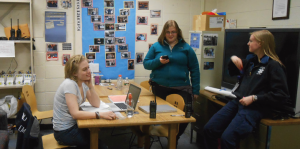The adrenaline-inducing voice/ Emergency calls for Lions’ EMS
By Colleen Murphy
The Signal
A call on the radio breaks the friendly, laid back atmosphere of the Lions’ EMS room. The three first-responders become silent and freeze, waiting to see what the person on the radio has to say. Where are they responding to? Is the incident serious?

On-call every night, for the College’s safety. (Colleen Murphy/ Production Manager)
“The Voice,” which is playing on the large Sony television, becomes background noise. The adrenaline in the room increases. All ears are tuned to the radio.
False alarm. It was just a call from maintenance saying that a lamppost in one of the lots was out. The first-responders breathe a sigh of relief.
But, on this Tuesday night, the responders were only into their second hour of duty. There were 10 hours ahead of this crew of student volunteers, and they would be ready whenever a call for them came in on the radio.
Fifteen years ago, there was no emergency service organization at the College. Before Lions’ EMS, the campus would rely solely on Ewing Township EMS and Pennington Road Emergency Medical Unit to respond to all emergency calls on campus, John DeJesus according to junior biology major and Lions’ EMS crew chief.
There were several attempts to form a campus EMS group in the 1970s, according to DeJesus, but it finally took hold in 1998.
“Like-minded students trained in emergency care saw a need for a group to respond to emergency calls on campus and a way to use and improve their skills. They petitioned the school and eventually were allowed to form,” DeJesus said.
Since then, Lions’ EMS, a division of Campus Police, has responded to approximately 108 calls a semester. During the 2011-2012 academic year, members were on call for 239 emergencies and volunteered more than 3,180 hours, according to the Lions’ EMS website.
From January 2009 to today, Lions’ EMS has covered over 915 calls. Last semester alone, the squad responded to 122 calls and volunteered 1,752 hours of duty crew time and about 57 hours of stand-by time at events, according to DeJesus.
While a majority of the calls within the 15 years have been for intoxication, there are a plethora of other calls, according to junior biology major and Lions’ EMS Deputy Chief Megan Wyles, who said lacerations, minor burns, possible bone fractures, allergic reactions and diabetic and behavioral emergencies are also common.
“We are trained to deal with many types of emergencies that can range from cardiac arrest to complicated childbirth, and many others in between,” Wyles said. “Many of us have come across our fair share of seemingly ‘common’ and ‘uncommon’ calls in the line of duty here at the College.”
Lions’ EMS does more than provide emergency care to the campus, though, according to Wyles.
“Lions’ EMS stands by at many large-scale events, such as concerts and Funival, in order to make our services readily available to anyone who may need them. We also host an annual blood drive in the fall and provide blood pressure screenings to the TCNJ and Ewing communities at various events throughout the year,” Wyles said. “We have participated in a project run by Student Health 101. These are just a few of many events we have participated in over the years.”
But three years ago, the services Lions’ EMS provides were all in danger of being shut down due to the resignation of its then-supervisor, according to junior nursing major and Lions’ EMS Secretary Alana Barouch. College employee Scott Sferra took on the position, and has now supervised the squad for three years. Under these years of his supervision, Lions’ EMS has grown to be stronger than ever, according to Barouch.
“We wear more professional, personalized uniforms and badges for the first time. We’ve acquired new radios and equipment,” Barouch said. “Most importantly, we finally have a hard-earned response vehicle. Our electric car, equipped with EMS supplies and emergency lights, allows us to respond to calls much faster than when we responded on foot with heavy backpacks.”
One major way in which the squad has become more efficient and timely is having a central location to respond from.
Up until a few years ago, Lions’ EMS had no squad room — their equipment was stored in a closet in Eickhoff Hall, according to Wyles. When a call came in, the responders on duty would have to run to Eickhoff to grab their supplies, and then to the scene.
Fortunately, the need for a room so that the members can respond better as a group was seen. A vacant residence director’s room in Decker Hall was converted into the squad’s response room. Equipped with a bathroom, kitchen, lounge area, and two sets of bunk beds, the room is said to have a “family-friendly atmosphere.” The crews on weekend shifts are assigned chores, including washing and folding the bed sheets, cleaning the bathroom, vacuuming, and making sure all the radios are fully charged.
It is in this room where crews stay for hours at a time, ready to answer any calls that might come in.
“Each three-member duty crew has an 11-hour night shift every other week, and about one 24-hour weekend shift a month. We cover every night and all weekend, totaling 103 hours a week, plus standing by at events on campus,” Barouch said. “Also, we are beginning an ‘all-call’ system, in which members can keep their radios on during daytime hours on weekdays, and respond to calls when available.”
While Lions’ EMS has had its obvious positive impacts on the College within the last 15 years, the organization might have had its biggest effect on its 35 active responders.
“Being a part of Lions’ EMS has shaped my experience at the College. I’m proud of how much time, effort, skill and dedication we put into providing care to the TCNJ community. I love the work we do and the close bonds we form, and everything we’ve been able to learn from each other,” Barouch said.
Fifteen years ago, there was no campus emergency response team. Three years ago, Lions’ EMS was in jeopardy of folding. But today, it is stronger than ever, and its supervisor, Sferra, could not be more impressed.
“I’m extremely proud to have the opportunity to be the supervisor of a fantastic organization. Each member brings to the organization medical knowledge, experience and dedication that has proven time and time again in caring for (his or her) patients,” Sferra said. “When I was asked if I was willing to supervise Lions’ EMS several years ago, it was an honor for me to be asked. Each year brings new members and new challenges however the commitment of each member makes those challenges very conquerable. I could not be more proud of a fine group of emergency medical providers.”

